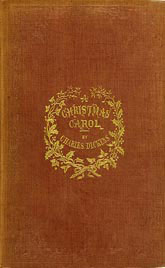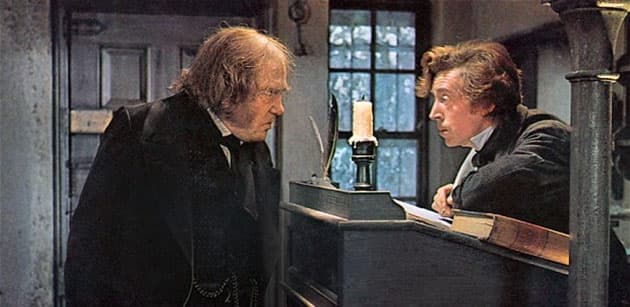A Christmas Carol
Critique • Text • At the movies
 First edition
First editionOriginal title
A Christmas Carol. In Prose. Being a Ghost Story of Christmas.
First publication
1843
Literary form
Novella
Genres
Literary
Writing language
English
Author's country
England
Length
Approx. 28,000 words

Albert Finney as Scrooge, left, confronts David Collings as Bob Crachit in the 1970 musical.
A Scrooge you can mumble along with
Scrooge (1970): Musical film, 113 minutes; director Ronald Neame Hurst; writer Leslie Bricusse; featuring Albert Finney, Edith Adams, Kenneth Moore, David Collings, Alec Guinness
Do we really need a musical version of essentially the same endearing and enduring 1951 film? Not much.
Yet the 1970 singing-dancing Scrooge is affecting nonetheless. It's in colour but of sombre tones and the superb acting lifts it into the top rank of Christmas Carol films.
Albert Finney, then only 34 years old by my calculations, is an effective old miser in the title role. (He's seen playing his real age only in the Christmas Past flashbacks.)
And, thank goodness, he doesn't often break into song. The big productions mainly feature other members of the cast while Scrooge either mumbles along or, when he's alone, speaks the lyrics Rex Harrison-style. In fact, Finney is a rather quiet Scrooge for much of the film, relying on his classic acting skills to get across his inner torment without a lot of histrionics.
The supporting cast is a Who's Who of English theatrical talent, with Dame Edith Evans as a classy Christmas Past, Kenneth More as the expansive Christmas Present and Alec Guinness as a Marley who, strangely, borders on comic, even as he's introducing Scrooge to hell in the Christmas Future segment.
Yes, that's one of the few wholesale additions to the Christmas Carol story by this movie treatment: Ebenezer goes beyond the famous graveyard scene into his own afterlife.
Oddly, it's literally also one of the brighter scenes in this Scrooge. Hell shines with 1970s Day-Glo colours as muscular henchmen chain Scrooge to his office as Lucifer's eternal clerk.
The conclusion departs also from the usual script, as for once Scrooge plays a central role in a big production number, this one seemingly involving the entire city of London. Everyone shares the joy of Scrooge's conversion, together singing and dancing to "I Love Life" and "Thank You". The movie aims to end on a high note and send you out humming the songs. And sure enough it works.
This may not be the most realistic or most dramatic Christmas Carol, but it could be the best feel-good movie of the group.
— Eric

